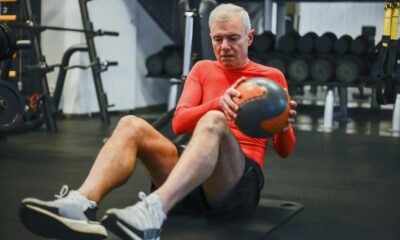News Items
Aging and its Impact on Life Expectancy and Health Span
Discover the impact of aging on life expectancy and health span. Explore the growing population of centenarians and the factors that influence longevity. Learn about the new life stage of middlescence and the social club Romeo for retired men. Plus, find out how to transition from work to retirement with renewment.
Did you know that aging affects not only our life expectancy but also our health span? It’s true! In 2022, the average life expectancy was around 77.5 years, while the health span was only 66.1 years. However, there is some good news too. The number of centenarians, those who live to be 100 years or more, is on the rise, with an estimated 422,000 expected in 2054. While aging is influenced by our genes, it’s also influenced by our lifestyle choices, such as our diet, exercise routine, and social connections. In fact, there’s a new life stage called middlescence, which occurs between the ages of 45 and 65 and is characterized by introspection and new beginnings. To support retired men, there’s a social club called Romeo, which stands for Retired Old Men Eating Out. For career women transitioning from work to retirement, there’s a term called “renewment” that combines retirement and renewal. So, let’s explore the fascinating world of aging and discover how we can make the most of our golden years.

This image is property of www.dailynews.com.
Aging and Life Expectancy
Definition of aging
Aging refers to the process of growing older and experiencing the changes that come with it. It is a natural and inevitable part of life that impacts everyone. As you age, your body undergoes physiological, psychological, and social changes that can influence your quality of life.
Understanding life expectancy
Life expectancy is the average number of years a person is expected to live based on various factors such as their birth year, gender, and overall health. It is an important statistic that provides insight into societal health and well-being. In 2022, the average life expectancy was 77.5 years, indicating an improvement in healthcare and overall living conditions.
Factors that influence life expectancy
Numerous factors can influence life expectancy, both positively and negatively. Genetic predispositions, lifestyle choices, healthcare access, and socioeconomic status all play a role in determining how long an individual is likely to live. By understanding and addressing these factors, it is possible to improve and extend life expectancy for individuals and communities.
Trends and changes in life expectancy
Over the years, life expectancy has exhibited significant changes and trends. Advances in healthcare and medical technology, improved sanitation, and increased awareness of healthy lifestyles have contributed to the overall increase in life expectancy. However, it is important to note that there are still disparities in life expectancy based on race, income, and geographic location. Efforts are being made to address these disparities and ensure that everyone has the opportunity to live a long and healthy life.
Health Span and Aging
Introducing health span
Health span refers to the number of years during which an individual can live in good health and without the burden of chronic illnesses or functional decline. It focuses on maintaining physical, mental, and emotional well-being throughout the aging process. While life expectancy indicates how long a person may live, health span emphasizes the quality of those years.
Difference between health span and life expectancy
While life expectancy and health span are related, they are not synonymous. Life expectancy measures the average number of years a person is expected to live, regardless of their health status. On the other hand, health span looks specifically at the number of years a person can live in good health. It is possible for individuals to live a long life but experience a decline in health, reducing their health span.
Health span as a measure of successful aging
Health span is increasingly being recognized as a key measure of successful aging. It highlights the importance of maintaining and promoting good health throughout the lifespan. By prioritizing healthy behaviors, managing chronic conditions, and addressing social determinants of health, individuals can enhance their health span and age successfully.
Factors impacting health span
Various factors can impact an individual’s health span. These include lifestyle choices such as diet, physical activity, and substance use, as well as access to healthcare, social support, and socioeconomic status. By adopting healthy behaviors, seeking regular preventive care, and engaging in activities that promote overall well-being, individuals can optimize their health span and enjoy a higher quality of life as they age.
Centenarians: The Growing Population
Definition of centenarians
Centenarians are individuals who have reached the age of 100 years or older. They represent a growing population segment as advancements in healthcare and living conditions have increased life expectancy. The achievement of centenarian status is seen as a testament to longevity and resilience.
Statistics and projections
The number of centenarians is steadily increasing. In 2022, there were an estimated 422,000 centenarians worldwide. Projections suggest that this number will continue to rise as life expectancy improves and the global population ages. By 2054, it is estimated that there will be over 3.7 million centenarians worldwide.
Contributing factors to reaching 100 years
Reaching the age of 100 requires a combination of genetic factors and a healthy lifestyle. While genetics play a role, lifestyle choices such as maintaining a balanced diet, staying physically active, minimizing stress, and having strong social connections are also important. Centenarians often have remarkable stories of resilience and adaptability, serving as inspiration for living a long and fulfilling life.
Implications for healthcare and society
The increasing number of centenarians has several implications for healthcare and society as a whole. Healthcare systems need to adapt to the unique needs of this aging population, focusing on preventive care, chronic disease management, and geriatric medicine. Additionally, society must address issues related to social support, long-term care, and financial security to ensure that centenarians can age with dignity and enjoy a high quality of life.
Longevity: Genes vs. Lifestyle
Role of genes in determining longevity
Genes play a significant role in determining an individual’s potential for longevity. Certain genetic variations can influence factors such as cellular aging, susceptibility to diseases, and overall health. However, genetics are not the sole determining factor, and they interact with lifestyle choices and environmental factors to shape an individual’s lifespan.
Importance of lifestyle factors
While genes set the foundation, lifestyle factors play a crucial role in determining how those genetic predispositions are expressed. Healthy lifestyle choices, such as maintaining a balanced diet, engaging in regular physical activity, and avoiding tobacco and excessive alcohol consumption, can positively impact longevity. Lifestyle choices can modify the influence of genes, allowing individuals to optimize their health and potentially extend their lifespan.
Influence of diet on aging and longevity
Diet plays a vital role in aging and longevity. Consuming a nutrient-rich, balanced diet can help protect against chronic diseases, support overall health, and promote longevity. A diet high in fruits, vegetables, whole grains, lean proteins, and healthy fats provides essential nutrients, antioxidants, and phytochemicals that contribute to optimal health. It is important to avoid excessive consumption of processed foods, saturated and trans fats, and added sugars, as they can increase the risk of chronic diseases and accelerate the aging process.
Impact of exercise on aging
Regular physical exercise has been shown to have numerous health benefits and can positively impact aging and longevity. Engaging in aerobic exercises, strength training, and activities that promote flexibility and balance can improve cardiovascular health, maintain muscle mass, enhance cognition, and reduce the risk of chronic diseases. Exercise also plays a crucial role in managing stress, promoting mental well-being, and maintaining a healthy weight. Incorporating regular physical activity into your daily routine can have a significant impact on your overall health and longevity.
Effects of social connections on longevity
Social connections and a strong support network have been linked to increased longevity. Maintaining meaningful relationships, participating in social activities, and fostering a sense of belonging can have a positive impact on mental health and overall well-being. Social connections provide emotional support, reduce stress, and can even influence healthy behaviors. By prioritizing social interactions and nurturing relationships, you can contribute to a longer and more fulfilling life.

This image is property of www.dailynews.com.
Middlescence: A New Life Stage
Definition and characteristics of middlescence
Middlescence refers to a new life stage that occurs between the ages of 45 and 65. It is a period of transition and transformation characterized by introspection, self-exploration, and the pursuit of new goals and passions. Middlescence represents a time of reevaluation and reinvention as individuals navigate the challenges and opportunities of midlife.
Exploring the age range of middlescence
The age range of middlescence spans from 45 to 65, encompassing a significant portion of mid-adulthood. This stage often coincides with major life events such as children leaving the nest, career advancements or changes, and shifts in personal priorities. Middlescence provides an opportunity for individuals to reflect on their achievements, reassess their goals, and make necessary adjustments to align their life path with their evolving desires.
Psychological changes during middlescence
Middlescence is marked by psychological changes as individuals navigate the challenges and transitions of midlife. It is common to experience introspection, questioning the meaning and purpose of life, and reassessing personal values and priorities. Middlescence may bring about feelings of restlessness, dissatisfaction, or a sense of urgency to make changes. However, it can also be a time of personal growth, self-discovery, and the pursuit of passions that may have been put on hold.
Opportunities and challenges of this life stage
Middlescence presents both opportunities and challenges. It is a time to explore new interests, pursue personal aspirations, and make meaningful changes to align one’s life with their values. However, it can also be a period of uncertainty, as individuals face the challenges of redefining their identity, navigating career transitions, and managing responsibilities. By embracing the opportunities and seeking support, individuals can embrace the transformative potential of middlescence and create a fulfilling and purposeful second half of life.
Romeo: Retired Old Men Eating Out
Introduction to Romeo social club
Romeo, which stands for “Retired Old Men Eating Out,” is a social club designed specifically for retired men. It offers a platform for camaraderie, friendship, and shared experiences among individuals who have entered the stage of life characterized by retirement.
Origins and purpose of Romeo
Romeo was established with the goal of providing a supportive and social environment for retired men. It offers opportunities for members to connect with one another, engage in various activities, and enjoy meals together. The club aims to combat social isolation and loneliness often experienced during retirement while fostering a sense of community and belonging.
Activities and benefits for retired men
Romeo provides a range of activities and benefits for retired men. It organizes regular outings, events, and gatherings where members can socialize, explore shared interests, and form meaningful connections. The club offers a supportive network for retirees to discuss their experiences, exchange advice, and provide emotional support to one another. By actively engaging in social activities through Romeo, retired men can maintain social connections and enjoy an enriched retirement experience.
Support and socialization in retirement
Retirement can often bring about a significant change in social dynamics and daily routines, leading to feelings of isolation and loneliness. The Romeo social club addresses these challenges by providing a platform for retired men to come together, share their stories, and foster new friendships. The supportive nature of the club helps individuals navigate the transition from the workplace to retirement by providing a sense of purpose, companionship, and ongoing socialization.

This image is property of www.dailynews.com.
Renewment: Transitioning from Work to Retirement
Defining renewment
Renewment is a term that combines retirement and renewal, highlighting the transformative nature of transitioning from work to retirement. It emphasizes the importance of personal growth, self-discovery, and finding new sources of fulfillment during this stage of life.
Supporting career women in retirement
Renewment is particularly important for career women transitioning into retirement. Many women have invested significant time and energy into their careers and may face unique challenges when leaving the workforce. Support systems, mentorship programs, and resources tailored to the needs of career women can help facilitate a smooth transition and empower them to explore new opportunities, passions, and personal growth in retirement.
Challenges and opportunities for renewment
The transition from work to retirement can present both challenges and opportunities. It can be a time of uncertainty as individuals navigate changes in routine, social connections, and personal identity. However, it also provides an opportunity to pursue new interests, engage in lifelong learning, and contribute to communities through volunteer work or mentoring. By embracing the challenges and seizing the opportunities of renewment, individuals can find purpose, fulfillment, and continued personal growth in retirement.
Promoting personal growth and fulfillment
Renewment promotes personal growth and fulfillment as individuals explore new aspects of their identity and pursue activities that bring them joy and purpose. By taking the time to reflect on their values, passions, and goals, individuals can craft a retirement filled with meaningful experiences, personal development, and continued contribution to society. Through renewment, retirement becomes a time of self-discovery and ongoing renewal, allowing individuals to lead a fulfilling and purposeful life beyond their careers.
In conclusion, aging should be viewed through the lenses of both life expectancy and health span. While life expectancy measures the average number of years a person is expected to live, health span focuses on the quality of those years. Centenarians, individuals who reach the age of 100 or older, are a growing population that highlights the potential for longevity and the need to address social, healthcare, and societal implications. Longevity is influenced by both genetic factors and lifestyle choices, emphasizing the importance of adopting healthy behaviors, such as a balanced diet, regular exercise, and social connections. Middlescence, a new life stage between 45 and 65, represents a time of introspection, reinvention, and personal growth. Social clubs like Romeo provide support and socialization for retired men, while renewment encourages career women to find fulfillment and personal growth in retirement. By understanding these various aspects of aging, individuals can navigate the aging process with optimism, purpose, and an enhanced quality of life.











